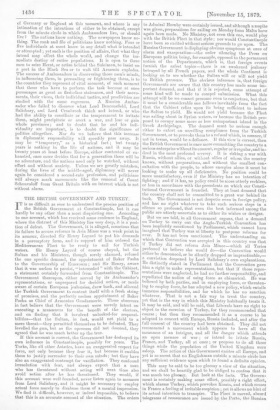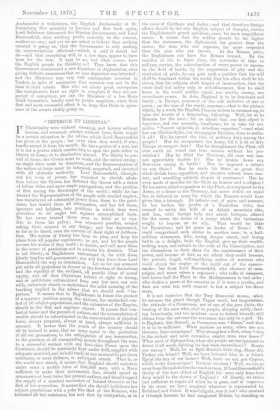THE BRITISH GOVERNMENT AND TURKEY.
IT is as difficult as ever to understand the precise position of the British Government at Constantinople, but it can hardly be any other than a most disquieting one. According to one account, which has received some credence in England, where the distrust of this Ministry lies very deep, it is a posi- tion of defeat. The Government, it is alleged, conscious that its failure to secure reforms in Asia Minor was a weak point in its armour, directed Sir Henry Layard to put his demands in a peremptory form, and hi support of him ordered the Mediterranean Fleet to be ready to sail for Turkish
waters. Sir Henry Lays rd of course obeyed, but the Sultan and his Ministers, though sorely alarmed, refused the one specific demand, the appointment of Baker Pasha to the Governorship of Erzeroum ; and Sir Henry, aware that it was useless to persist, "interceded " with the Cabinet, a statement certainly forwarded from Constantinople. The Government thereupon, either moved by its Ambassador's representations, or unprepared for decided action, or made aware of certain European jealousies, drew back, and allowed the Turkish Government to content itself with a fresh string of promises, and the perfectly useless appointment of Baker Pasha as Chief of Armenian Gendarmerie. These observers in fact believe that the Government were merely intent on executing a manceuvre for the benefit of the electors, and on finding that it involved unlocked-for responsi- bilities—that the Sultan, ' in fact, would not yield to a mere threat—they permitted themselves to be defeated. They levelled the gun, but as the opossum did not descend, they agreed that he was much better up the tree. If this account is correct, the Government has destroyed its own influence in Constantinople, possibly for years. The Turks, like all other Asiatics, have an exaggerated respect for force, not only because they fear it, but because it enables them to justify surrender to their own minds ; but they have also an exaggerated contempt for vacillation. They confound irresolution with fear, and always expect that a man who has threatened without acting will next time also avoid °action after he has threatened. They would, if this account were well founded, never listen again to menaces from Lord Salisbury, and it might be necessary to employ actual force merely to disabuse them of a mental impression. We find it difficult, however, or indeed impossible, to believe that this is an accurate account of the situation. The orders to Admiral Hornby were certainly issued, and although a respite was given, preparations for sailing on Monday from Malta have again been made. No Ministry, not even this one, would play with the British Fleet in that style ; nor would Constantinople have been so excited without serious grounds to go upon. The Russian Government is displaying obvious symptoms at once of alarm and exasperation—the order silencing the Press on European politics being, for example, opposed to the permanent notion of the Departments, which is, that foreign events furnish the safest topics—there is an awakened jealousy betrayed by all French papers, and the whole Continent is looking on to see whether the Sultan will or will not yield to British pressure. The obvious inference is, that foreign Governments arc aware that this country has made some im- portant demand, and that if it is rejected, some attempt of some kind will be made to compel submission. What this attempt will be we cannot presume even to conjecture, but that it must be a considerable one follows inevitably from the fact that the Cabinet relies upon its being sufficient to induce the Sultan to yield. He would not yield because the Fleet was sailing about in Syrian waters, or because the British pro- posed to occupy some more or less unimportant island in the Greek Archipelago. The demand must be serious enough either to extort an unwilling compliance from the Turkish Government, or to provoke them to a refusal which, in essence, if not in terms, would be a defiance. If this view is correct, then the British Government is once more committing the country to a serious enterprise without its consent, regular or irregular, and in- deed in the most profound secrecy. It is risking a war with Russia, without allies, or without allies of whom the country knows, without preparations, and without the smallest con- sultation with the people, to whose energies alone it must be looking to make up all deficiencies. No position could be more unsatisfactory, even if the Ministry has no intention of fighting; and if it has, no policy could be more utterly reckless, or less in accordance with the precedents on which our Consti- tutional Government is founded. They at least demand that the country shall not be committed to a great war behind its back. The Government is not despotic even in foreign policy, and has no right whatever to take such serious steps in a silence so profound, that even the best informed among the public are utterly uncertain as to either its wishes or designs.
But we are told, in all Government organs, that a demand on Turkey to carry out the Anglo-Turkish Convention has been implicitly sanctioned by Parliament, which cannot have imagined that Turkey was at liberty to postpone reforms for ever. It has not been sanctioned. The understanding on which that Convention was accepted in this country was that if Turkey did not reform Asia Minor—which all Tories professed to believe she would do—the Convention would either be denounced, or be silently dropped as impracticable,— a conviction deepened by Lord Salisbury's own explanations. He distinctly stated in Parliament that the Convention gave him a right to make representations, but that if those repre- sentations were neglected, he had no further responsibility, and repudiated the notion of using force as chimerical, He was believed by both parties, and in employing force, or threaten- ing to employ force, he has adopted a new policy, which entails immense responsibilities, and for which he has no sanction whatever. That is not a fair way to treat the country, yet that is the way in which this Ministry habitually treats it. It may be said, and will be said, that Liberals have no right to object to the coercion of Turkey, for they recommended that course ; but then they recommended it as a course to be adopted in concert with Europe, Russia included, and after the full consent of the country had been obtained. They did not recommend a movement which appears to have all the meanness of an intrigue, and all the danger which attends an open menace of war ; or intend to iritate Russia, France, and Turkey, all at once ; or propose to do all these things while the population of the United Kingdom were asleep. The action of this Government excites all Europe, and yet is so secret that no Englishman outside a minute circle has any sufficient evidence upon which to found a definite opinion.
This may be said to be too gloomy a view of the situation, and we shall be heartily glad to be obliged to confess that it was much too gloomy. But look at the facts. The Govern- ment is certainly making some effort, possibly a right effort, which alarms Turkey, which provokes Russia, and which rouses in France a feeling of irritable suspicion ; yet it allows no hint of its actual intention to transpire. The Fleet is moved, absurd telegrams of reassurance are issued by the Porte, the Russian
Ambassador is withdrawn, the English Ambassador at St. Petersburg flies privately to London and flies back again, Lord Salisbury denounces the Russian Government, and Lord Beaconsfield, after exciting public curiosity to the utmost, soothes no one ; and yet we are asked to believe that nothing unusual is going on, that the Government is only making its representations effectual—which it said it would not do—and that everything will, in a few days, appear to have been for the best. It may be so, but what reason have the English people for thinking so V They know that this Government commenced a new departure in Afghanistan, after giving definite assurances that no new departure was intended ; and the Ministers may very well contemplate coercion in Turkey, in spite of assurances that coercion was not in the least in their minds. Men who set about great enterprises like conspirators have no right to complain if they are sus- pected of conspiracy, nor can the Ministers of a free State think themselves hardly used by public suspicion, when their first and most successful effort is to keep that State in ignor- ance of the events visibly going on.



































 Previous page
Previous page